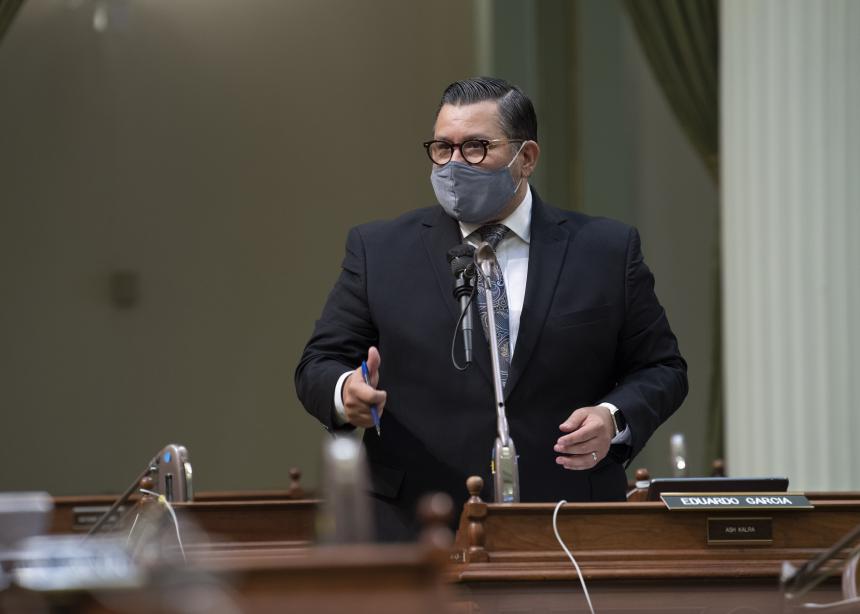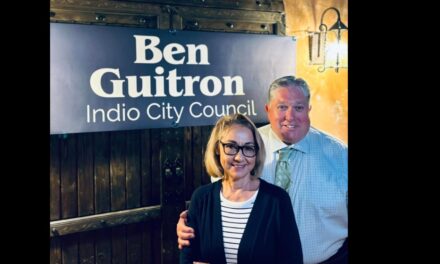Look for Assemblymember Eduardo Garcia, D-Coachella, who serves on the California Department of Education’s Closing the Digital Divide Task Force, to use his political heft to push an $8 billion to $10 billion infrastructure broadband bond act to close the digital divide — and make sure that the majority of the money goes to underserved, and unconnected areas of the state.
“Someone might get pretty scared with that number,” Garcia told Uken Report. “But we also have to keep in mind the economic benefits of ensuring that everyone is connected from an education standpoint, especially with what we’ve seen happening with our students, learning from home. I can tell you it’s been a challenge seeing it firsthand with our 6-year-old.”
Assemblymembers Garcia; Al Muratsuchi, D-Torrance; and Miguel Santiago, D-Los Angeles; along with Principal Coauthor Sen. Steve Glazer, D-Orinda, introduced the California Broadband for All Bond Act, AB 34, a general obligation bond measure of up to $10 billion to close the digital divide throughout California.
 The goal of the measure is to close the digital divide by investing in statewide broadband infrastructure and increasing access to high-speed internet in unserved and underserved communities throughout the state. The bill will also help jumpstart the state’s economic recovery and support public education, telecommuting, telehealth and telemedicine, emergency response and preparedness, and other vital services.
The goal of the measure is to close the digital divide by investing in statewide broadband infrastructure and increasing access to high-speed internet in unserved and underserved communities throughout the state. The bill will also help jumpstart the state’s economic recovery and support public education, telecommuting, telehealth and telemedicine, emergency response and preparedness, and other vital services.
It’s not just students who need broadband services, Garcia said. Businesses need the service to keep transactions moving forward, rural hospitals need it to continue their care, and so do public safety services and their communications.
“The list just kind of continues, which is why we can no longer look at this as an amenity,” Garcia said. “Now more than ever, it’s an essential need for us.”
The new infrastructure bill will align with the goals and objectives of his bill from 2017, AB 1665, the Internet for All Act, bill, which made improvements and extended $300 million into the California Advanced Services Fund for broadband infrastructure projects.
Garcia has been a steadfast champion of legislative efforts to bridge the digital divide. He realizes there is still work to do.
“The California Legislature is preparing to go big to address our immediate and long-term broadband disparities. This measure is a critical component in securing the investments needed to bridge the digital divide in unserved communities. I highly commend Assemblymember Muratsuchi for his commitment to this issue, and proudly join him along with a coalition of our colleagues on a package of policy proposals to ensure internet access for all,” Garcia.said.
The COVID-19 Pandemic has exacerbated the deeply entrenched digital divide, which has left many lower income, Latino, African American, and rural communities without access to high-speed broadband services1. Whether it be children doing homework outside of fast-food restaurants, or medically-fragile individuals who can’t access services through tele-health care, the pandemic has shown a spotlight on the inequality in access to broadband that has existed in our state for years. The implications of a continued long-term lack of access to telehealth services for at-risk populations, or the loss of critical education time for developing students, are massive and must be addressed.
Even before the COVID-19 Pandemic, over half of all internet traffic was data-rich video, requiring higher-capacity networks,2 and in 2017, 31% of Californians, 12 million people, had no or insufficient broadband access.
Given current circumstances, the need for fast high-quality internet and future-proof infrastructure has never been more immediate or severe. The existing California Advanced Services Fund program has a goal of providing sufficient internet access to 98% of Californians. However, four major problems with the current CASF program prevent the fund from achieving its goal.
“We want to make sure that all communities are included, and that means Indian country as well,” Garcia said. “We want to make sure that we’re very intentional when we say that Indian lands become eligible, without having to waive sovereignty, or anything of that sort to receive this money, because in our area, we know that there aren’t any boundaries, any borders, and we need to serve, whether it be water infrastructure or sewer infrastructure. It’s critical that that money make its way to places like our district, where we have no infrastructure.”
It’s one thing to have the infrastructure, Garcia said, but it must be affordable,
“There are some ideas that are being kicked around in conjunction with the Superintendent of Public Schools,” Garcia said.
Don’t expect Garcia to stop there. He has a list of other bills that deal with internet issues.
“Affordable housing complexes need to be assured of broadband connectivity. So, there’s a comprehensive approach,” Garcia said. “This year, we’re going to get a lot done, I anticipate, on the issue of broadband connectivity in California.”





![Enrolling Now, Rewarding Careers Ahead [Sponsored]](https://ukenreport.com/wp-content/uploads/2024/04/COD_heroes_1-1385-2-440x264.jpg)


